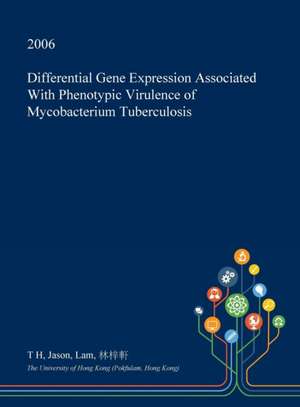Differential Gene Expression Associated with Phenotypic Virulence of Mycobacterium Tuberculosis
Autor Lam, T. H. Jason Creat de 林梓軒en Limba Engleză Hardback
Abstract:
Abstract of thesis entitled
Differential Gene Expression Associated with Phenotypic Virulence of Mycobacterium tuberculosis
submitted by
Jason T.H. Lam
for the degree of Master of Philosophy at the University of Hong Kong in August 2006
Tuberculosis (TB) remains one of the major infectious diseases and leading causes of death in the world. The ability to persist in human macrophages is central to the virulence of Mycobacterium tuberculosis (Mtb), the causative agent of TB, and is not invariable among various strains of Mtb. Particular strains of Mtb, named hypervirulent strains, grow significantly faster and persist inside the human macrophages. Atypical gene expression present in these hypervirulent strains may provide a clue to explore the virulent factors involved in the pathogenesis of Mtb, which are not fully elucidated.
In the current study, 3 hypervirulent strains were identified from 118 clinical isolates of Mtb by determining the colony-forming unit (CFU) inside human peripheral blood monocyte-derived macrophages (PBMDMs) at day 0, 3, 6, and 10. Interestingly, all the 3 hypervirulent strains were isolated from patients suffering TB meningitis, which is the severest form of TB. Genotyping by insertion sequence 6110-restriction fragment length polymorphism (IS6110-RFLP) revealed that 2 of the 3 hypervirulent isolates were identical strains, probably spread by recent transmission. Mycobacterial gene expression during ex vivo macrophage challenge was measured by means of relative quantification using LightCylcer 2.0 Instrument. Using rrs gene as a normalisation gene, which was demonstrated to has least variation among 3 normalisation genes chosen, only fadE28 gene exhibited differential gene expression that was associated with the phenotypic virulence of Mtb, whereas the other 6 genes investigated, which include mce1A, mymA, acr, sigA, sugC, and Rv3723, showed indistinguishable expression patterns. The differential fadE28 expression also observed during in vitro acid shock suggests that the expression of fadE28 may be induced by the acidification of phagosome inside the human macrophages.
Up-regulation of fadE28 gene in the hypervirulent strains may partly contribute to the virulence by increasing the efficiency of beta-oxidation (β-oxidation), which is essential for the persistence in human macrophages as Mtb probably uses fatty acids preferably to produce energy in the phagosome of macrophages. It is also possible that fadE28 is involved in an unknown process of lipid modification, as there are 35 paralogues of FadE proteins, which have been largely neglected. Findings of this study may lead to consideration of the genes involved in β-oxidation, including the fadE28 gene, when constructing a live attenuated Mtb vaccine strain.
DOI: 10.5353/th_b3776900
Subjects:
Mycobacterium tuberculosis - Pathogenesis
Bacterial genetics
Gene expression
Preț: 438.71 lei
Preț vechi: 461.80 lei
-5% Nou
Puncte Express: 658
Preț estimativ în valută:
83.99€ • 86.37$ • 69.67£
83.99€ • 86.37$ • 69.67£
Carte indisponibilă temporar
Doresc să fiu notificat când acest titlu va fi disponibil:
Se trimite...
Preluare comenzi: 021 569.72.76
Specificații
ISBN-13: 9781374664616
ISBN-10: 1374664618
Pagini: 170
Dimensiuni: 216 x 280 x 11 mm
Greutate: 0.69 kg
ISBN-10: 1374664618
Pagini: 170
Dimensiuni: 216 x 280 x 11 mm
Greutate: 0.69 kg
